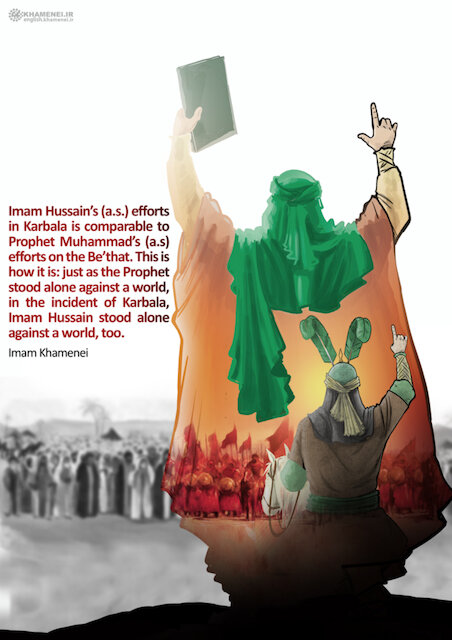The prophets save humans; so, in the Quran, one important purpose of prophethood is said to be establishing justice. “We sent Our Messengers with clear evidence (to support their truthfulness), and sent with them the Book and the Balance so that people would maintain justice {Quran; 57:25}.” In fact, the divine books and the prophets were sent in order for justice to be established in societies; that is, to remove the symbols of oppression, coercion and corruption. The movement of Imam Hussain (a.s.) was a movement of such nature. He said: “I rose up to reform the Muslim community of my grandfather [Prophet Muhammad (PBUH)].” (Bihar Al-Anvar: V.44, P. 329) He also said: “Whoever observes a ruler legalize what God has made unlawful, violating the covenant of God, opposing the Sunnah of the Messenger of God, and treating the creatures of God sinfully and oppressively; he who does not oppose him with his speech and action, God has a right to bring him to the same fate as that of the tyrant.” (Bihar al-Anwar, v. 44, p. 381) That is if a person sees where corruption and oppression emerge from, yet they do not do anything to oppose the source of corruption and oppression, for God the Exalted, they have the same fate as the corrupt oppressor. He said that he did not rise up for the cause of wickedness, amusement, corruption or oppression. The people of Iraq invited Imam Hussain (a.s.) to rule over them, and Imam Hussain (a.s.) answered their request. So, it is not that Imam Hussain (a.s.) did not think of creating a government; he was indeed thinking of overturning tyrannical powers; either by taking the government away from them or by martyrdom.
Imam Hussain (a.s.) knew what would his silence, his endorsement and his indifference would do to Islam if he did not take any action. When a power takes all the capacities of a community or some communities under control, and acts tyrannically, if the men of truth do not oppose him, refuting his actions, they have actually endorsed his actions. That is, oppression is endorsed by the men of truth, without them really wanting it. This was a sin committed by the elites from among the Bani-Hashem, and the children of the prominent figures of the early years of Islam. Imam Hussain, however, would not tolerate it, and hence he rose up. It is narrated that after Imam Sajjad (a.s.) returned to Medina from Karbala-- maybe ten or eleven months passed between the time this caravan left Medina and returned-- a person visited him and said: "Oh! Son of the Messenger of Allah, you see, you went and what happened?” He was right; the caravan had left while Imam Hussain (a.s.), the bright sun of Ahlulbait, so much loved by the Messenger of Allah, was among them, leading them. The daughter of Imam Ali (a.s.) had left while she was dignified and honored. The children of Imam Ali (a.s.) --Abbas and others-- the children of Imam Hassan (a.s.), prominent and talented youth of Bani Hashem had all left with this caravan. But the caravan returned with only one man -- Imam Sajjad (a.s.), with the women gone through sufferings of captivity and loss of their loved ones. Imam Hussain (a.s.), Ali Akbar (a.s.), even the baby were now gone. Imam Sajjad (a.s.) answered that man, stating: "Imagine what would have happened if we had not gone."
Yes! If they had not gone, their bodies might have survived, but the truth would have died. The soul would have died out. Consciences would have been shattered. Logic and reason would have been condemned throughout history, and even the name of Islam would not have remained.
March 18, 2002

